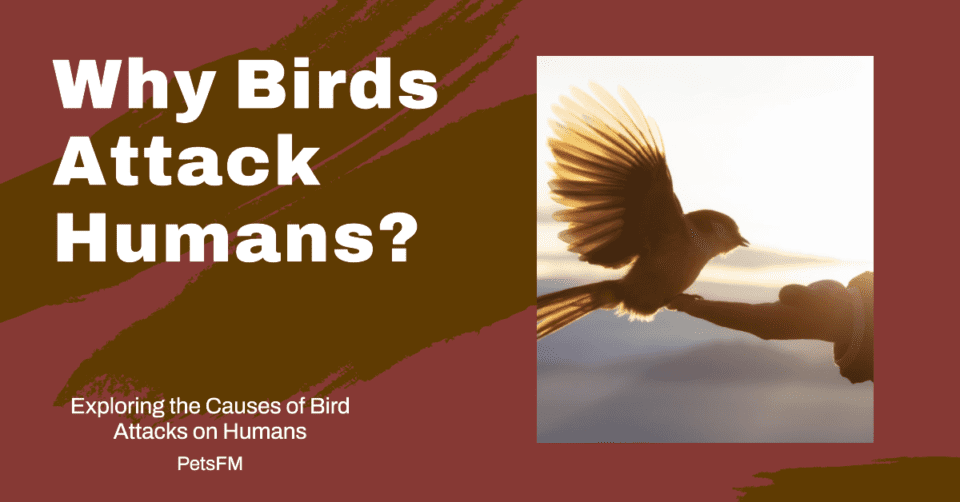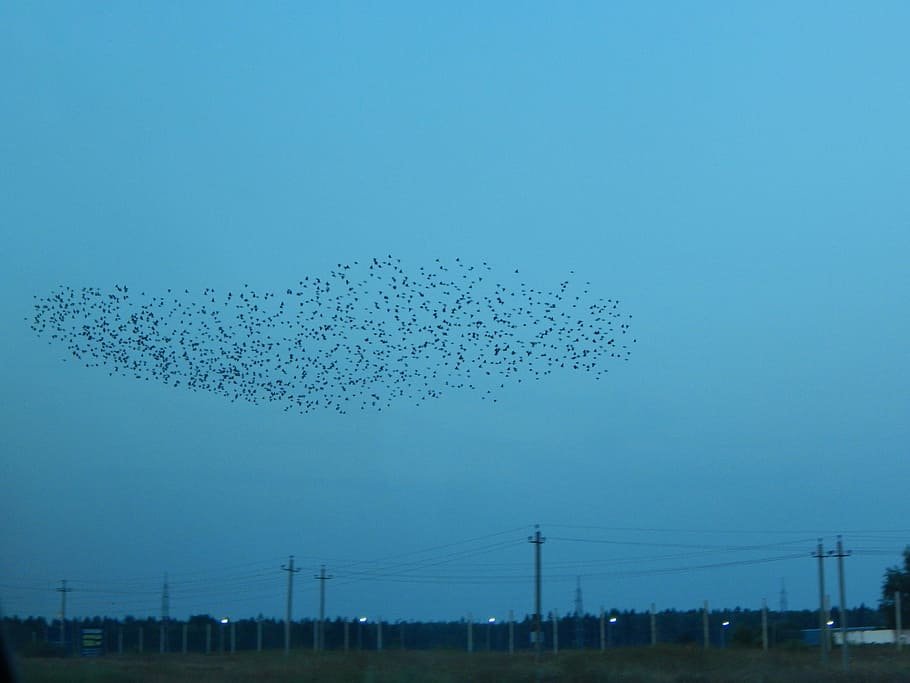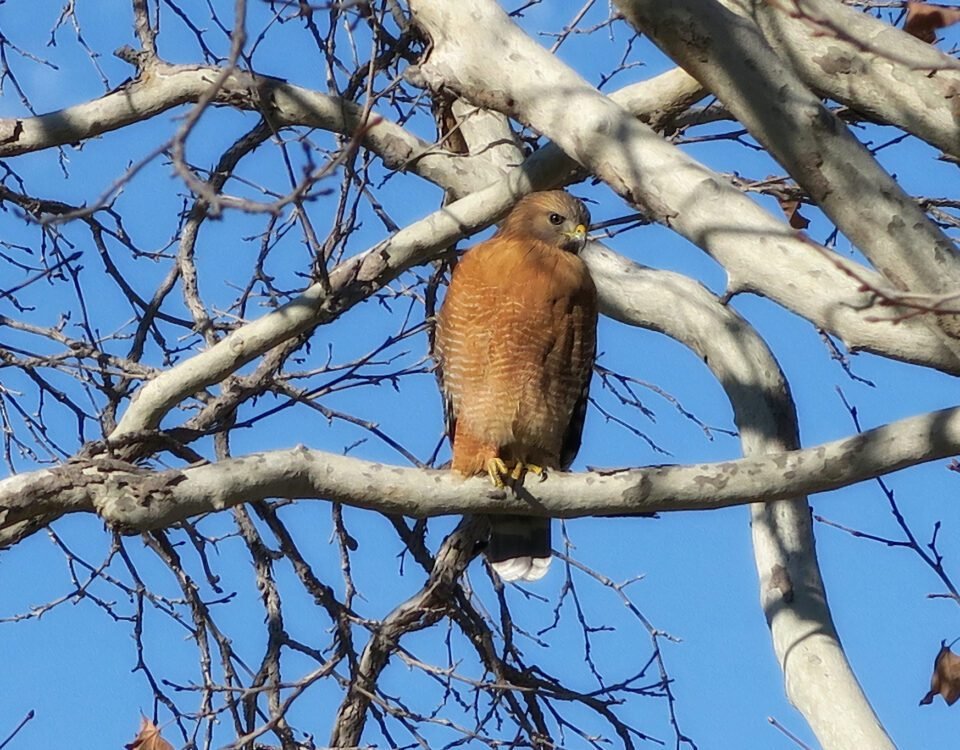


Why Do Birds Attack Cats? Understanding and Prevention
September 19, 2023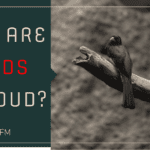


Why Are Birds So Loud in Morning and Evening? A Guide
September 19, 2023Have you ever wondered why birds occasionally dive from branches and flutter above you? Though rare, birds can exhibit aggressive behavior towards people and other animals. But what drives birds to display such aggressive tendencies?
Talking about humans, let’s delve into the distinctive bird behavior to understand better. We’ll explore the reasons why birds might target humans.
Don’t forget to read Why Do Birds Get Aggressive and What You Need to Know?
Why Do Birds Attack Humans?
Birds often lash out at humans as a protective response. It’s possible you unintentionally ventured too near their nest on a low branch or unknowingly approached their chicks while taking pictures of a tree. They naturally dive down to ward you off from their safe sanctuary.


Why Do Birds Attack Humans?
Many of these confrontations are spontaneous and can catch one off guard, making them challenging to anticipate or counter. After all, it’s only sometimes feasible to check overhead for potential bird threats constantly!
For example, birds may also target you because of your hair. If you have:
- Curly locks
- Puffy tresses
- Tousled strands
Don’t be afraid if a small bird lands and hovers above your head. Why? Your hair might resemble a vibrant, twitchy, mobile nest! Additionally, certain birds exhibit unique aggression patterns.
Did you know, for instance, that crows can recall a face for as long as five years? These intelligent birds scrutinize your features and movements, identifying you and your actions, and can even alert their companions.
So, if you’ve upset a crow, harmed it, or caused it distress, brace yourself for potential dive-bombs and flaps from that crow for years to come! Let’s continue to explore other reasons why a bird might attack you and your friends!
Birds Attacking Humans – The Primary Reasons
Though it is a rare sight, birds can attack humans for the following reasons.
Natural Behavior and Territorial Instincts
Birds are naturally territorial, fiercely guarding their nests, food, and habitat. They perceive outsiders, including humans, as potential hazards to their well-being. As a result, when they sense danger, their response can be to lash out at humans aggressively.
Protectiveness Over Their Offspring And Nests
Like many creatures, birds are highly protective of their chicks and nests. Their primary instinct is safeguarding their young’s welfare, sometimes becoming aggressive toward perceived threats, including humans. The bird may respond defensively if someone ventures near their nesting site or fledglings.
Rivalry for Food Resources
During times like the breeding season, when nourishing their young is crucial, birds compete for food. If a human unintentionally interferes with a bird’s quest for food, the bird might view this as a competitive threat and react aggressively.
Human Provocation and Bird’s Defensive Fear
Humans can inadvertently infuriate birds by encroaching upon their space, making abrupt gestures or sounds, or even maintaining prolonged eye contact. Birds might interpret such actions as hostile, prompting them to retaliate. Similarly, a fearful bird might resort to aggression as a means of self-defense against what it perceives as danger.
Misreading of Human Actions
Sometimes, birds can misjudge human activities as adversarial. For instance, a person wielding an item resembling a predator to the bird, like a stick or broom, might provoke an aggressive response. Additionally, specific clothing colors or designs might be interpreted by birds as potential threats, prompting them to act defensively.
Hormonal Fluctuations
Particularly during mating seasons, birds experience hormonal shifts that can influence their behavior. Male birds can exhibit increased aggression and territorial tendencies, while female birds might become particularly vigilant about their nests and chicks. Encountering humans during such periods can quickly escalate into confrontations.


Behavior Specific to Certain Species
Certain bird species are inherently more assertive than others and may more readily confront humans. Birds of prey, such as hawks, eagles, and owls, equipped with potent beaks and claws, might defensively attack humans when they feel endangered.
Human Influence on Avian Habitats
Human-induced factors like deforestation, pollution, and the destruction of natural habitats can alter bird behaviors. Birds may increase aggression towards humans if their habitats are compromised or disturbed.
Injured or Ailing Birds
Injured or unwell birds may display intensified aggression arising from feelings of vulnerability. Approaching such a bird can lead to seeing the human as a potential threat, leading to defensive behavior. Furthermore, birds afflicted with diseases or infections might also exhibit increased hostility toward humans.
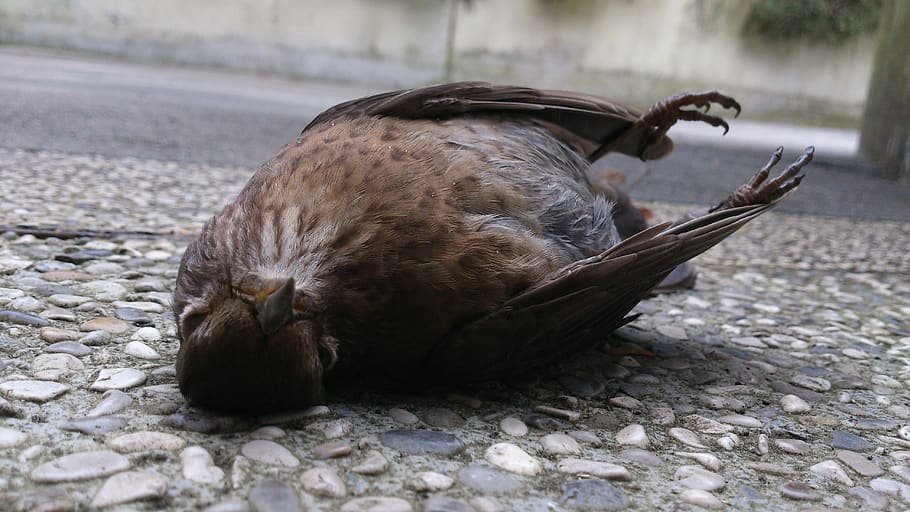

Motionless Bird
Artificial Feeding
Feeding birds in public spaces or parks can lead to unexpected aggressive behaviors. As birds grow accustomed to human-provided food, they might develop a dependency. If this feeding ceases, birds can express their frustration and aggression in pursuing food.


Feeding Birds
Migration Period
During their migration, birds can exhibit territorial tendencies and heightened aggression, driven by their quest for sustenance and establishing nesting grounds. Humans entering such territories during this time might be seen as threats, prompting defensive reactions from the birds.
Defensive Flocks
Certain avian species, like crows and magpies, engage in coordinated group attacks to safeguard their domain or food sources. Encroaching their territory or jeopardizing their food supply can instigate a collective aggressive response from these birds.
Human Actions
Various human actions can provoke birds, including loud sounds, sudden motions, or intentional confrontational gestures. An individual who exhibits aggressive behaviors or enters bird territories without heed can be perceived as a threat, leading to defensive bird behaviors.
Interesting Read: Why US bird attacks on humans are on the rise
Which Birds Are Known For Attacking Humans?
The following birds are the most popular for attacking humans:
- Australian Magpie: These black and white birds are known for swooping attacks during nesting season to protect their territory.
- Seagulls can become aggressive when their nesting sites are approached or around food.
- Crows: Crows possess a strong memory and may retaliate against specific humans based on past interactions.
- Red-winged Blackbirds: These birds often dive-bomb intruders during their nesting period.
- Hawks and Eagles: Birds of prey that can become aggressive if they perceive threats to their nests or are provoked.
- Owls: Generally elusive but can defend their nesting zones fiercely, especially during nighttime.
- Cassowaries: Found in northern Australia and the tropical forests of New Guinea, they are potentially dangerous due to their robust legs and sharp talons.
- Swans and Geese: Territorial birds that can become aggressive, especially during breeding times.
- Mute Swans: Recognized for their assertive behavior, especially when safeguarding their offspring.
- Plovers (Masked Lapwing in Australia): Known for swooping behaviors during their breeding phase.
- Emus: While not typically aggressive, they can attack when threatened, utilizing their powerful legs.
- Swallows: While small, they can become territorial and swoop at perceived threats during the nesting season.
- Mockingbirds: They are very protective of their nests and are known to dive-bomb and peck at intruders, including humans.
- Ostriches: The world’s most giant birds, ostriches can become aggressive when threatened, and with their powerful legs and sharp claws, they can deliver dangerous kicks.
- Lammergeier (Bearded Vulture): A large bird of prey, it’s not typically known for attacking humans but, like all wild animals, can become aggressive if provoked or feels threatened.
Related Read: Why Do Birds Attack Cats?
What Is Dive-bombing?
Dive-bombing or swooping down is one of the most common strategies birds use as a defensive mechanism. This action primarily aims to deter perceived threats rather than inflict harm. When a bird engages in dive-bombing, its primary objective is to protect its territory, nest, or young ones.
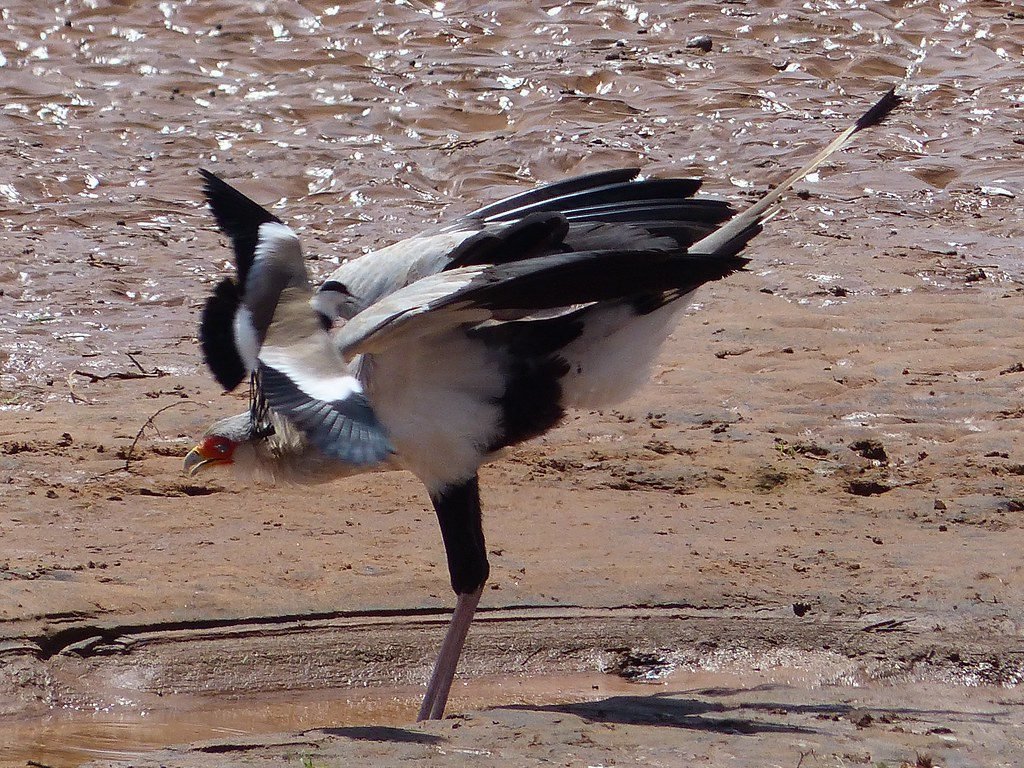

Dive Bombing Birds
The behavior signals the bird’s discomfort or distress concerning the intruder’s presence. By swooping down at high speeds, often with loud vocalizations, the bird tries to startle and scare off potential threats.
This action not only catches the intruder off-guard but also showcases the bird’s agility and determination to defend its space.
While the bird’s intent is typically not to injure, those on the receiving end of a dive-bomb might suffer minor scratches or injuries, especially if the bird makes contact using its talons or beak.
Protective behaviors like dive-bombing highlight the importance of giving wild animals their space and being aware of our surroundings, especially during nesting seasons when birds are more likely to be on high alert.
Other Behaviors Birds Show Before Attacking Humans
Besides dive-bombing, there are many signs birds show before attacking their intruders. For example:
Vibrant Displays
Many birds possess flashy hues on parts like their wings, crests, tails, or crowns, which they showcase when disturbed. By revealing these colors, either by fluffing their feathers or manipulating their head, they intend to issue a warning.
This visual phenomenon serves as an intimidation tactic aimed at deterring potential contenders.
Postural Changes
The stance of a bird often conveys its emotions and intentions. An angered bird might either elongate its posture, making itself appear taller or assume a defensive crouch.


Angered Bird
Actions such as briskly flicking its tail or extending its wings can also be interpreted as the bird wanting to seem more prominent and daunting. Such gestures imply a readiness to confront or retreat.
Vocal Indicators
Numerous birds possess distinct alarm cries or vocalizations like sharp beak clacks or hisses, indicative of discomfort or agitation.
Characteristically, these vocalizations are jarring and loud, intended to warn fellow birds of potential dangers or to repel intruders. Some avians might even replicate human voices or other ambient sounds to confuse or irritate humans.
Chasing Behavior
Some birds might retaliate by chasing the intruders if humans encroach on their territory or jeopardize their nests. This chasing action might persist for varied durations, depending on the bird’s perseverance and energy levels.
Some birds might even try to block humans, compelling them to alter their route or halt altogether.
Deceptive Acts
Birds occasionally show distraction displays to divert attention away from their nesting zones. These actions include the bird pretending vulnerability or engaging in peculiar behaviors, primarily drawing the intruder’s attention.
The bird aspires to mislead people by simulating an injury, allowing its young ones to escape while being hidden.
What Can You Do If A Bird Attacks You?
If a bird attacks you, shield your head with your arms and quickly exit the area. If injured, consult a medical professional immediately.
To avoid conflicts, maintain a respectful distance from birds and their nests. Do not feed them, as this can encourage aggressive behavior.
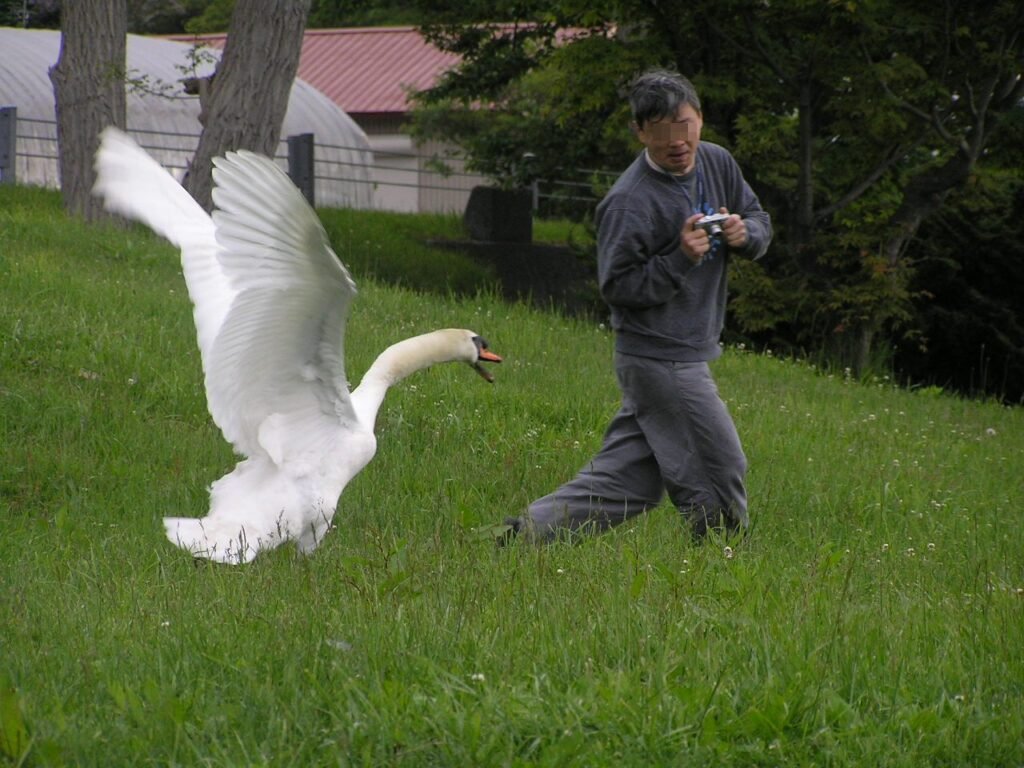

Swan Attacks Man
If a bird near your home displays protective behaviors like dive-bombing, exercise patience and give them space until their chicks have left the nest. During this period, consider using alternate entrances to your property or carrying an umbrella for added protection.
Note that it’s illegal to relocate a nest containing eggs or chicks. You may remove the nest once the young birds have left to discourage future nesting in the exact location.
Editor’s Pick: How Do Birds Clean Themselves?
Conclusion
The occasional confrontations between birds and humans highlight the complexity of the animal world and the rich history of our collective natural legacy. While these encounters can be unexpected and unsettling, they emphasize the vital need for mutual respect and harmony.
Instead of viewing such bird interactions as purely adversary, they invite us to delve deeper into birds’ nuanced behaviors and reflect upon our position within their environment.
By deepening our understanding of the motivations behind these avian actions, we can reduce possible tensions and, in turn, cultivate a more profound admiration for the vast array of life that surrounds us.
